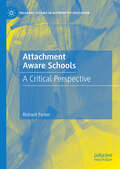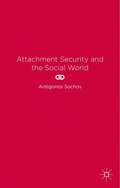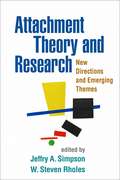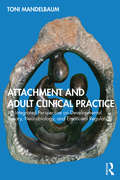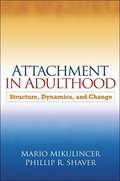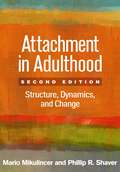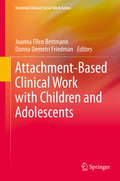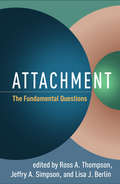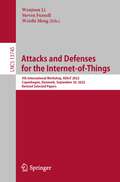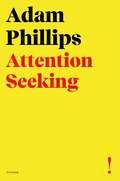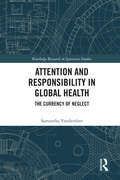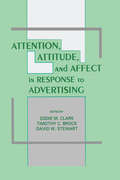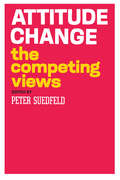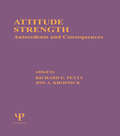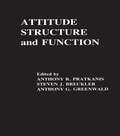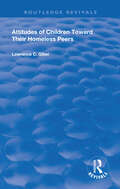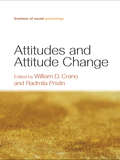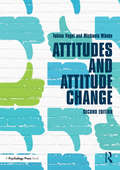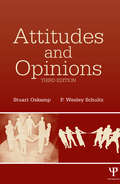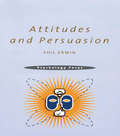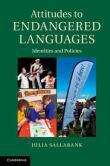- Table View
- List View
Atoms, Bytes and Genes: Public Resistance and Techno-Scientific Responses (Routledge Advances in Sociology #126)
by Martin W. Bauer"Atom," "byte" and "gene" are metonymies for techno-scientific developments of the 20th century: nuclear power, computing and genetic engineering. Resistance continues to challenge these developments in public opinion. This book traces historical debates over atoms, bytes and genes which raised controversy with consequences, and argues that public opinion is a factor of the development of modern techno-science. The level and scope of public controversy is an index of resistance, examined here with a "pain analogy" which shows that just as pain impacts movement, resistance impacts techno-scientific mobilization: it signals that something is wrong, and this requires attention, elaboration and a response to the challenge. This analysis shows how different fields of enquiry deal with the resistance of social-psychological mentalities in the face of industrial, scientific and political activities inspired by projected futures.
Attachment Aware Schools: A Critical Perspective (Palgrave Studies in Alternative Education)
by Richard ParkerThis book offers a unique exploration of attachment aware schools, bringing together empirical teacher views along with wider theoretical and policy perspectives. Attachment aware schooling demonstrates an understanding of the emotional and behavioural needs of children and young people which go beyond training and experience, in order to promote better learning and health outcomes. The author reviews the key principles of attachment theory, the features of attachment aware schools and the tensions that exist in current education policy in England. He then explores issues around gender, social justice and social policy in relation to trauma-informed and attachment aware practice. The book will be of interest to academics and students in the fields of alternative education, the sociology of education, education policy and social psychology.
Attachment Security And The Social World
by Antigonos SochosWith an overview of the existing attachment theory literature and new contributions to the field, this book proposes that social groups seek protection and security as they collectively construct their ideologies and social institutions. In doing so, the book extends attachment theory to show how it can inform wider socio-cultural phenomena.
Attachment Theory and Research
by Jeffry A. Simpson W. Steven RholesThis volume showcases the latest theoretical and empirical work from some of the top scholars in attachment. Extending classic themes and describing important new applications, the book examines several ways in which attachment processes help explain how people think, feel, and behave in different situations and at different stages in the life cycle. Topics include the effects of early experiences on adult relationships; new developments in neuroscience and genetics; attachment orientations and parenting; connections between attachment and psychopathology, as well as health outcomes; and the relationship of attachment theory and processes to clinical interventions.
Attachment and Adult Clinical Practice: An Integrated Perspective on Developmental Theory, Neurobiology, and Emotional Regulation
by Toni MandelbaumThis comprehensive volume addresses attachment theory’s history as well as its integration with neurobiology, psychophysiology, theories of emotion, regulation theory, and mentalization theory. It explores how clinicians can connect with their clients so that they feel completely seen and heard. Attachment theory speaks to one’s biological drive to connect, to relate, and to feel heard. The author aims to achieve this by condensing the enormous and diverse literature of the field into a singular, manageable work that clinicians can use to foster these connections. The book traces the history of attachment theory and describes how neurobiological research has influenced the expansion of attachment theory, and how emotions and psychophysiology have become critical to our understanding of human attachment connections. It concludes with a detailed examination of how to apply these theories in clinical practice. This practical book addresses attachment theory’s take on integrating the mind, body, and emotion when striving toward well-being. It will be of great importance for psychotherapy students, beginning therapists, and experienced clinicians with an interest in attachment theory.
Attachment in Adulthood
by Phillip Shaver Mario MikulincerThis authoritative work provides a systematic, comprehensive overview of theory and research on adult attachment. The authors who have been at the forefront of this rapidly growing field since the concepts of "adult attachment" and "attachment style" were first developed trace how Bowlby and Ainsworth's original constructs have evolved through the study of adolescents and adults. They review extant measures and analyze how attachment theory has been used to advance scientific understanding of emotions, social cognition, close relationships, psychopathology, and psychotherapy.
Attachment in Adulthood
by Phillip R. Shaver Mario MikulincerThis authoritative work provides a systematic, comprehensive overview of theory and research on adult attachment. The authors-who have been at the forefront of this rapidly growing field since the concepts of "adult attachment" and "attachment style" were first developed-trace how Bowlby and Ainsworth's original constructs have evolved through the study of adolescents and adults. They review extant measures and analyze how attachment theory has been used to advance scientific understanding of emotions, social cognition, close relationships, psychopathology, and psychotherapy.
Attachment in Adulthood, Second Edition: Structure, Dynamics, and Change
by Phillip R. Shaver Mario MikulincerSynthesizing a vast body of empirical research and organizing it around a comprehensive conceptual model, this book is recognized as the definitive reference on adult attachment. The authors explain how what began as a theory of child development is now used to conceptualize and study nearly all aspects of social functioning across the lifespan, including mental representations of self and others, emotion regulation, personal goals and strivings, couple relationships, caregiving, sexuality, psychopathology, psychotherapy, and organizational behavior. The origins and measurement of individual differences in adult attachment are examined, as is the question of whether and how attachment patterns can change. New to This Edition: *Reflects major advances, including hundreds of new studies. *Clarifies and extends the authors' influential model of attachment-system functioning. *Cutting-edge content on genetics and on the neural and hormonal substrates of attachment. *Increased attention to the interplay among attachment and other behavioral systems, such as caregiving and sexuality. *Expanded discussion of attachment processes in counseling and psychotherapy. *Additional coverage of leadership, group dynamics, and religion.
Attachment in Religion and Spirituality: A Wider View
by Pehr GranqvistSynthesizing diverse strands of theory and research, this compelling book explores the psychology of religion and spirituality through an innovative attachment lens. Pehr Granqvist examines the connections between early caregiving experiences, attachment patterns, and individual differences in religious cognition, experience, and behavior. The function of a deity as an attachment figure is analyzed, as are ways in which attachment facilitates the intergenerational transmission of religion. The book also shows how the attachment perspective can aid in understanding mystical experiences, connections between religion and mental health, and cultural differences between more and less religious societies. Granqvist's conversational writing style, concrete examples, and references to popular culture render complex concepts accessible.
Attachment-Based Clinical Work with Children and Adolescents (Essential Clinical Social Work Series)
by Donna Demetri Friedman Joanna Ellen BettmannAttachment-Based Social Work with Children and Adolescents is a wide-ranging look at attachment theory and research, its application to youth populations, and its natural fit with the social work profession. This book covers the applicability of attachment theory to the profession's various domains that include human behavior, practice, policy, research, and social work education. In particular, it addresses the broad spectrum of clinical social work, including practice in a variety of public and private settings and with a number of diverse populations. The book highlights the contribution of the social work profession to the development of attachment theory and research.
Attachment: The Fundamental Questions
by Ross A. Thompson, Jeffry A. Simpson, Lisa J. BerlinThe ongoing growth of attachment research has given rise to new perspectives on classic theoretical questions as well as fruitful new debates. This unique book identifies nine central questions facing the field and invites leading authorities to address them in 46 succinct essays. Multiple perspectives are presented on what constitutes an attachment relationship, the best ways to measure attachment security, how internal working models operate, the importance of early attachment relationships for later behavior, challenges in cross-cultural research, how attachment-based interventions work, and more. The concluding chapter by the editors delineates points of convergence and divergence among the contributions and distills important implications for future theory and research.
Attacks and Defenses for the Internet-of-Things: 5th International Workshop, ADIoT 2022, Copenhagen, Denmark, September 30, 2022, Revised Selected Papers (Lecture Notes in Computer Science #13745)
by Steven Furnell Weizhi Meng Wenjuan LiThis book constitutes the post-conference proceedings of the 5th International Workshop on Attacks and Defenses for Internet-of-Things, ADIoT 2022, held in conjunction with ESORICS 2022, in Copenhagen, Denmark, in September 30, 2022, in hybrid mode.The 7 full papers and 3 short papers were carefully reviewed and selected from 18 submissions. This workshop focuses on IoT attacks and defenses and discusses either practical or theoretical solutions to identify IoT vulnerabilities and IoT security mechanisms.
Attention Seeking
by Adam PhillipsAttention Seeking is a short, fascinating introduction to the concept of attention from Britain’s leading psychoanalyst, author of Missing Out and On Kindness.Everything depends on what, if anything, we find interesting: on what we are encouraged and educated to find interesting, and what we find ourselves being interested in despite ourselves. There is our official curiosity and our unofficial curiosity (and psychoanalysis is a story about the relationship between the two).Based on three connected lectures by Adam Phillips, this compact book is a lucid and memorable introduction to the concept of our attention, spanning from interest to obsession, private desire to corporate commodity. What is attention, and why do we seek it? How does our culture moralize attention as a force in need of control? Phillips is one of our brightest and most unusual thinkers, uniquely capable of bringing our deepest impulses and instincts to light.
Attention and Responsibility in Global Health: The Currency of Neglect (Routledge Research in Ignorance Studies)
by Samantha VanderslottAttention and Responsibility in Global Health shows the construction of health through what is neglected and how the label of neglect is used, to make the case that shift in attitudes towards tropical diseases is based on changing cultures of health and disease. Tropical diseases have moved from being of high importance for European empires to being neglected and unknown, and then returning to the spotlight once again. During this process, the understanding, framing and overall character of the disease grouping has changed through a rediscovery of a health issue once rendered neglectable. The book depicts this change in relevance of tropical diseases from colonial history to the present day diseases across political, cultural, and socio-economic contexts. It shows the transformation of tropical diseases as a grouping that uncovers the changing strategies, tactics and unintended consequences used in advocacy campaigning by scientists, NGOs and policymakers to drive disease issues up the policy agenda. Drawing on the emergent field of ignorance studies, the book explores ideas about the uses and deployment of strategic "not knowing". It is aimed at academics and students in science and technology studies, the sociology of health and medicine, environmental sociology, public policy, and the history of science.
Attention, Attitude, and Affect in Response To Advertising
by David W. Stewart Timothy C. Brock Eddie M. ClarkLinked from the days of their origins, psychology and advertising developed as independent disciplines at almost the same time in the late nineteenth century. Providing an important arena in which psychologists have tested methods and theories, advertising has been a stimulus for research and development in such diverse specialties as learning and behavioral decision theory, psychometrics, perception, and social and mathematical psychology. Psychology, in turn, has contributed a wide assortment of tools, theories, and techniques to the practice of advertising. These contributions have found their place in virtually all areas of advertising practice -- stimulating creativity, evaluating the creative product, and informing the scheduling of media. Purposely eclectic, this volume presents new issues in consumer psychology and advertising such as the relationship between gender differences, cortical organization and advertising; new approaches to old issues such as attention as an epiphenomenon, and meta-analysis of comparative advertising research; and new applications of consumer psychology to other fields such as examining health behavior as consumer behavior, affect and political advertising, and the relationship between advertising and eating disorders. This volume is the result of the Sixth Annual Advertising and Consumer Behavior Conference, which was designed to bring together researchers and practitioners from both psychology and advertising. Chapter contributions are made by professionals in advertising and marketing, professors in psychology and marketing departments, and psychologists who consult for advertising and marketing organizations. Thus, the chapters represent a microcosm of the type of interaction that has characterized the interface of psychology and advertising for more than a hundred years.
Attitude Change: The Competing Views (Controversy Ser.)
by Peter SuedfeldWhat are attitudes and how are they modified? The many opposing theories to answer this question reflects not only the complexity but also the importance of the field. A central concern of social psychology, attitude change is also relevant to the study of human behavior in general, and a matter of major significance to the world outside the laboratory. Valid and useful theories of attitude change are thus of far-reaching consequence. At the same time, the richness and flexibility of attitude structures and the numerous methodological problems involved in studying them make the development of a definitive theory difficult, if not impossible. For these reasons many explanations have been offered but none have been greatly accepted.The essays included here give voice to a broad sampling of these competing viewpoints. For years attention has been directed mostly to the individual's need to maintain harmony within him, and several of the authors focus on this concept. Cognitive dissonance theory is evaluated in particular detail. Ideas derived from other areas of psychology and attitude change theories based on learning, perception, and cognitive motivation are also well represented in this volume.In his introduction, Suedfeld evaluates these major approaches as well as several less well-known alternatives. In weighing the strengths and weaknesses of each system he considers the limits of the applications of the various theories and the problems the theorists face. This book will be welcomed in a variety of undergraduate and graduate courses, and by scholars and educated laymen seeking information on the current state of knowledge in this field.
Attitude Strength: Antecedents and Consequences (Ohio State University Volume On Attitudes And Persuasion Ser. #Vol. 4)
by Jon A. Krosnick Richard E. PettySocial psychologists have long recognized the possibility that attitudes might differ from one another in terms of their strength, but only recently had the profound implications of this view been explored. Yet because investigators in the area were pursuing interesting but independent programs of research exploring different aspects of strength, there was little articulation of assumptions underlying the work, and little effort to establish a common research agenda. The goals of this book are to highlight these assumptions, to review the discoveries this work has produced, and to suggest directions for future work in the area. The chapter authors include individuals who have made significant contributions to the published literature and represent a diversity of perspectives on the topic. In addition to providing an overview of the broad area of attitude strength, particular chapters deal in depth with specific features of attitudes related to strength and integrate the diverse bodies of relevant theory and empirical evidence. The book will be of interest to graduate students initiating work on attitudes as well as to longstanding scholars in the field. Because of the many potential directions for application of work on attitude strength to amelioration of social problems, the book will be valuable to scholars in various applied disciplines such as political science, marketing, sociology, public opinion, and others studying attitudinal phenomena.
Attitude Structure and Function
by Anthony G. Greenwald Anthony R. Pratkanis Steven J. BrecklerUtilizing "new wave" research including new psychological theories, new statistical techniques, and a stronger methodology, this collection unites a diversity of recent research perspectives on attitudes and the psychological functions of an attitude. The objective of the editors was to bring together the bits and pieces of validated data into one systematic and adequate set of general principles leading to the view of attitudes as predictions. As the volume reformulates old concepts, explores new angles, and seeks a relationship among various sub-areas, it also shows improvements in the sophistication of research designs and methodologies, the specifications of variables, and the precision in defining concepts.
Attitudes Of Children Towards Their Homeless Peers
by Lawrence C GibelFirst published in 1996, this study investigates whether housed children hold negative stereotypical ideas about their homeless peers. The study will also try to determine whether these stereotypes are generated by the label "homeless," the characteristics of being homeless such as poverty, or whether these stereotypes are held in response to an underlying racial prejudice.
Attitudes and Attitude Change (Frontiers of Social Psychology)
by William D. CranoThis volume assembles a distinguished group of international scholars whose chapters on classic and emerging issues in research on attitudes provide an excellent introduction for advanced undergraduates and graduate students. The book’s chapters cover all of the most critical features of attitude measurement, attitude development, and attitude change. Implicit and explicit approaches to measurement and conceptualization are featured throughout, making this one of the most up-to-date treatments of attitude theory and research currently available. The comprehensive coverage of the central topics in this important field provides a useful text in advanced courses on persuasion or attitude change.
Attitudes and Attitude Change (Social Psychology A Modular Ser.)
by Tobias Vogel Michaela WankeAttitudes have been a central topic in social psychology from its early beginnings. But what exactly are attitudes, where do they come from, and how can they be modified? The overall aim of Attitudes and Attitude Change is to provide students with a comprehensive and accessible introduction to these basic issues in the psychological study of attitudes. In four parts, readers learn about how attitudes can be measured, how attitudes are shaped in the course of life, how they are changed by other people, and finally, how attitudes in turn affect our thoughts and behavior. This completely revised and updated second edition covers many recent developments and reports cutting-edge research while also addressing the classic findings and theories that advanced the field. In addition to integrating the newly emerged topics of implicit attitudes and recent models regarding the coexistence of explicit and implicit attitudes, this edition also adds chapters on social influence and resistance to persuasion. This comprehensive and user-friendly book carefully balances theoretical underpinnings and empirical findings with applied examples to enable readers to use the insights of attitude research for practical applications. Critical discussions also instigate readers to develop their own thinking on key topics.
Attitudes and Decisions (Psychology Revivals)
by J Richard Eiser Joop van der PligtThe concept of attitude has long been a central part of social psychological theories. It is important in other disciplines too, such as economics, business studies, politics and sociology. Originally published in 1988, the authors of this text show how attitudes and motives are crucial in human decision-making, and explore the relationship between them. They look closely at the real context of people’s attitudes and behaviour, pointing out that attitudes are both a social product and an intrinsic part of social action. The authors show that theories of judgment, attitudes, attribution and decision-making can make important contributions to social issues such as the employment of nuclear energy, the storage of nuclear waste, health behaviour and medical decision-making. They emphasize that social psychology is relevant to a wide variety of social issues, deriving from the theoretical and distinctive methods that social psychology has developed.
Attitudes and Opinions
by Stuart Oskamp P. Wesley SchultzNotable advances resulting from new research findings, measurement approaches, widespread uses of the Internet, and increasingly sophisticated approaches to sampling and polling, have stimulated a new generation of attitude scholars. This extensively revised edition captures this excitement, while remaining grounded in scholarly research.Attitudes and Opinions, 3/e maintains one of the main goals of the original edition--breadth of coverage. The book thoroughly reviews both implicit and explicit measures of attitudes, the structure and function of attitudes, the nature of public opinion and polling, attitude formation, communication of attitudes and opinions, and the relationship between attitudes and behaviors, as well as theories and research on attitude change. Over 2,000 references support the book's scientific integrity. The authors' second goal is to demonstrate the relevance of the topic to people's lives. Subsequently, the second part of the book examines many of the topics and research findings that are salient in the world today--political and international attitudes (including terrorism), voting behavior, racism and prejudice, sexism and gender roles, and environmental attitudes.This thoroughly revised new edition features: *an entirely new chapter on implicit measures attitudes;*a new chapter on environmental attitudes;*updated opinion poll data throughout the book;*additional material on time trends in attitudes about many issues; and*expanded, updated sections on international attitudes reflecting the events of 9/11 and the subsequent invasions of Afghanistan and Iraq.Attitudes and Opinions' broad and interdisciplinary perspective makes this an ideal text in courses on attitudes, public opinion, survey research, or persuasion, taught in a variety of departments including psychology, communication, marketing, sociology, and political science.
Attitudes and Persuasion
by Philip ErwinAttitudes and Persuasion provides an up-to-date overview of the crucial role that attitudes play in our everyday lives and how our thoughts and behaviour are influenced. The nature, function and origins of attitudes are examined, and a review of how they can be measured is given. The book addresses complex questions such as whether we always behave in accordance with our attitudes and what factors may influence us to change them.
Attitudes to Endangered Languages
by Julia SallabankLanguage attitudes and ideologies are of key importance in assessing the chances of success of revitalisation efforts for endangered languages. However, few book-length studies relate attitudes to language policies, or address the changing attitudes of non-speakers and the motivations of members of language movements. Through a combination of ethnographic research and quantitative surveys, this book presents an in-depth study of revitalisation efforts for indigenous languages in three small islands round the British Isles. The author identifies and confronts key issues commonly faced by practitioners and researchers working in small language communities with little institutional support. This book explores the complex relationship of ideologies, identity and language-related beliefs and practices, and examines the implications of these factors for language revitalisation measures. Essential reading for researchers interested in language endangerment and revitalisation, sociolinguistics, linguistic anthropology and language policy and planning, as well as language planners and campaigners.

